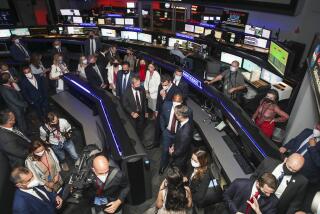Japan Is Urged to Help Pay for Schools in U.S.
- Share via
WASHINGTON — As a gesture of gratitude, Japan should donate $100 million a year to the United States with “no strings attached” to help modernize this country’s aging research laboratories and equipment, the president of the National Academy of Sciences said Tuesday.
By acknowledging the training that tens of thousands of Japanese students and scientists have received in the United States, such a “credible act . . . would be viewed very favorably by the American public and its political representatives,” Frank Press declared in a speech on the economic and technological challenges posed by Japan.
The amount he proposed is five times what the U.S. government is spending this year to refurbish the facilities.
Press also called for “a major initiative” to teach Americans the Japanese language and urged Japan to share more of its basic research discoveries with the rest of the world by publishing them.
The head of the country’s premier scientific organization further suggested that U.S. policy-makers draw up a “voluntary code of behavior” to define limits for foreign acquisition of U.S. high-tech firms that may be of “national economic security.” The idea, he said, would be to “ensure that the country of origin reaps some of the profits of innovation.”
Unusual for its candor and specificity, Press’ keynote address at the academy’s annual meeting came as a surprise to many, and it may well live up to his own prediction that the talk will become controversial.
Press, 65, delivered his 45-minute talk in a monotone that belied the punch of his message.
Many in the audience of several hundred scientists nodded quietly during Press’ speech and applauded warmly afterward. Many academy members said later that Press’ remarks had caught them off guard.
“I’m very surprised,” said a dubious Yasunori Nishijima, president of Kyoto University, referring to Press’ suggestion of an annual Japanese contribution of $100 million. “It’s not a matter of money, but a matter of concept . . . . I’m more in favor of collaboration.”
But Cornell researcher Thomas Eisner said: “There has to be real serious thought given to this.”
A senior official at the Japanese Embassy here expressed concern that such Japanese donations might be misconstrued as another attempt to buy into U.S. academia and industry, generating a backlash against Tokyo.
On Capitol Hill, a spokesman for one senator who has been critical of Japan’s trade practices declined to comment on Press’ proposals, calling them “sufficiently novel” to warrant further studies.
In recent years, the need to modernize America’s deteriorating scientific infrastructure, particularly in universities, has been discussed with increasing hand-wringing.
“You’re talking about facilities that were built in the 1950s and ‘60s, when a lot of dollars were available, and that modern science has essentially passed by,” said Robert M. Rosenzweig, president of the Assn. of American Universities.
In an interview, D. Allan Bromley, assistant to President Bush for science and technology, said: “Frank’s suggestion is a very innovative and interesting one toward a solution to what is becoming a very intractable problem in this country. It’s going to have a lot of discussion.”
Bromley, who with industrialist David Packard conducted a study of the problem in 1986, estimated that it would take $10 billion to adequately modernize laboratory facilities in the United States over the next decade.
Press said he arrived at the $100-million-a-year figure after analyzing immigration data that shows that more than 40,000 Japanese students and scientists annually arrive in the United States to study or do research--about 10 times the number of Americans who do so in Japan.
The resulting “negative balance of trade in training,” Press said, amounts to more than $100 million a year.
“This may be small compared to the $50-billion deficit in trade, but training is the precursor to productivity increases, new industries and future commercial success,” he said.
Press, a physicist who served as former President Jimmy Carter’s science adviser, acknowledged that it might be “politically difficult” for the Japanese government alone to come up with the $100 million, since its own universities have many unmet needs.
“Perhaps a consortium of Japanese companies conducting R&D; and manufacturing in the United States could play a major role,” he said.




